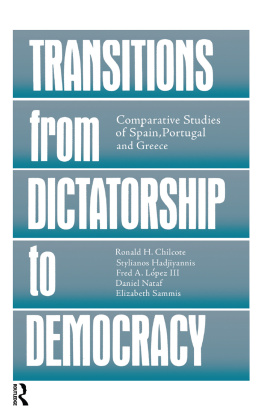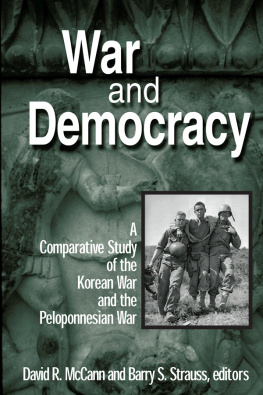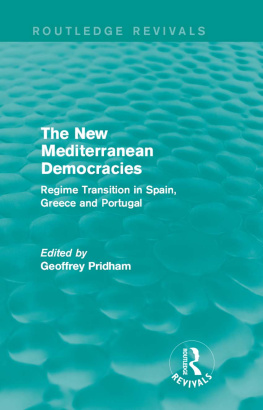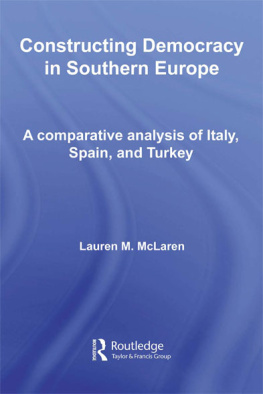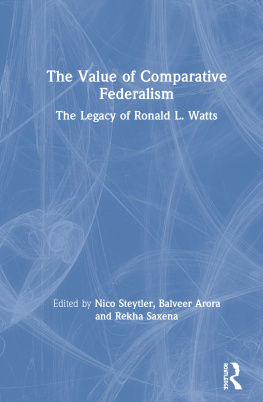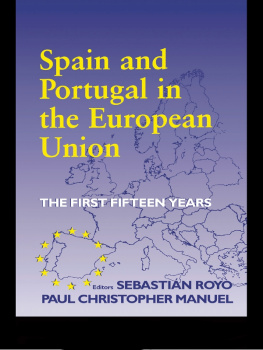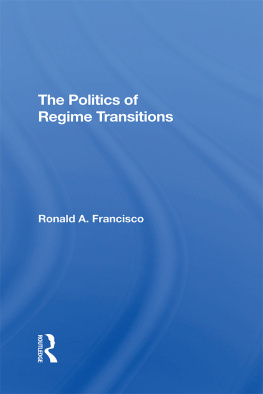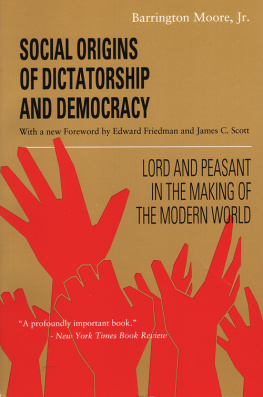TRANSITIONS from DICTATORSHIP to DEMOCRACY
Comparative Studies of Spain, Portugal, and Greece
Ronald H. Chilcote
Stylianos Hadjiyannis
Fred A. Lpez III
Daniel Nataf
Elizabeth Sammis
First published 1990
by CRANE RUSSAK
Published 2016 by Routledge
2 Park Square, Milton Park, Abingdon, Oxon OX14 4RN
711 Third Avenue, New York, NY, 10017, USA
Routledge is an imprint of the Taylor & Francis Group, an informa business
Transitions from Dictatorship to Democracy:
Comparative Studies of Spain, Portugal, and Greece
Copyright 1990 Taylor & Francis New York Inc.
All rights reserved. No part of this publication may be reproduced, stored in a retrieval system, or transmitted, in any form or by any means, electronic, electrostatic, magnetic tape, mechanical, photocopying, recording or otherwise, without the prior permission of the copyright owner.
Library of Congress Cataloging in Publication Data
Transitions from dictatorship to democracy: comparative studies of Spain, Portugal, and Greece / by Ronald H. Chilcote... [et al.].
p. cm.
Includes bibliographical references.
1. Europe, Southern--Politics and goverment. 2. Authoritarianism. 3. Democracy. I. Chilcote, Ronald H.
D1058.T725 1990 | 90-32110 |
320.53094--dc20 | CIP |
ISBN 13: 978-0-844-81675-3 (hbk)
ISBN 13: 978-1-138-99380-8 (pbk)
Contents
Ronald H. Chilcote
Fred A. Lpez III
Daniel Nataf and Elizabeth Sammis
Stylianos Hadjiyannis
Ronald H. Chilcote
In the late 1970s, Nicos Poulantzas, in Crisis of the Dictatorships: Portugal, Spain, Greece, applied his well-known theoretical perspectives to a concrete analysis of the major transformations that occurred in those three countries during 1974 and 1975. His provocative and interpretative analysis not only provided a basis for comparative study but also examined several important theoretical questions about transition from dictatorship to representative democracy and on to socialism. The present essays offer a retrospective assessment of this transition and examine current developments with particular attention to the role of the state and social classes in the overthrow of the old dictatorships, the evolution of representative democracy and political parties, and the formal integration of these countries into the European Economic Community and the international capitalist system.
Among the issues raised by Poulantzas and analyzed in this volume are: (1) whether a domestic bourgeoisie (largely national capital) achieves hegemony and dominance over a comprador bourgeoisie (compromised with foreign capital), (2) the question of the exceptional capitalist state (dictatorship) in a crisis of capital accumulation and political legitimacy and why the exceptional state persists when it faces severe internal contradictions, (3) emphasis on the strategic importance of bourgeois hegemony in the democratic transition, which must be balanced with an analysis of the strategies and tactics of the parties of the left, and (4) the Leninist strategy of dual power and frontal assault on the state contrasted with the movement of the popular classes within the apparatuses of the state, winning parliamentary elections, and gaining control of government. This analysis leads to an understanding of why a transition to socialism was not achieved in these countries even though the alliance of labor and a fraction of the capitalist class opened up and extended democracy as an initial step in the path toward socialism.
The essays in this volume are based on fieldwork in Southern Europe. As a graduate student during the early 1960s, I devoted nearly two years to research and study in Spain and Portugal. A series of journalistic reports and a book on Portuguese Africa (1967) resulted in the Salazar dictatorship declaring me persona non grata. My return to Portugal and Africa in the summer of 1975 and 1983 was associated with a desire to study in depth the exciting revolutionary developments of 1974 and 1975. Thanks to a sabbatical leave during 198586 and research visits during JuneJuly 1987 and JuneJuly 1988, I was able to carry out this task. The basic research is being published by the Centro de Documentao 25 de Abril of the University of Coimbra.
Prior to my sabbatical year I supervised the doctoral dissertations of Fred Lpez, who carried out his research on the transition to democracy in Spain, and Stylianos Hadjiyannis, who returned to his native Greece on four occasions to study the transition there. I also served on the dissertation committee of Elizabeth Sammis of UCLA whose work focused on the transition up to the April 25, 1974, coup in Portugal. Sammis joined with Dan Nataf who had written his dissertation on Portugal, and all of us decided to combine our research in a collective work to reassess and update the analysis of Poulantzas.
The writing of these essays has evolved through several drafts and a process of criticism and self-criticism in an effort to ensure balance in terms of presentation, organization, and length thereby allowing the reader a basis for comparison of recent theory and experience in Southern Europe.
Ronald H. Chilcote
Ronald H. Chilcote
During 1974 and 1975 Southern Europe was shaken by the overthrow of military dictatorships. On April 25, 1974, the nearly 50-year-old Portuguese regime, initiated by coup in 1926 and sustained under Antnio de Oliveira Salazar and Marcello Caetano, fell to progressive elements in the armed forces long disenchanted with the debilitating colonial wars in Africa and desiring change at home. On July 24, the seven-year-old military Greek junta fell, the consequence of an abortive intervention in Cyprus and dis-illusionment among both bourgeois and popular classes. A year later began the gradual dismantling of the regime of Francisco Franco, who had ruled since victorious in the Spanish civil war in 1939.
Acompanying these dramatic events were popular euphoria and expectations and demands for reforms and substantial change from the authoritarian practices of the old regimes. A transition from precapitalist to capitalist relations of production had been evident for some time in all three countries despite their obvious backwardness when contrasted to the advanced industrial nations of Western Europe. The immediate objective was achievement of a transition from the old dictatorships to democracy, but the problematic of attaining a democracy involved alternative courses of action: on the one hand, the establishment of formal representative or parliamentary democracy, the preservation of bourgeois capitalist hegemony, and the further consolidation and expansion of capitalism; on the other, the struggle toward socialism, the implementation of democratic socialism, participatory democracy, and ultimately the socialization of the means of production.
During the middle of the nineteenth century in his analysis of the state and class struggle in revolutionary France, Karl Marx, in The EighteenthBrumaire of Napoleon Bonaparte (1852), focused on this problem of a transition to democracy. In the late 1970s Marxist academics set forth to unravel the intricacies of the transition in Spain, Portugal, and Greece. In a series of published letters, French philosopher Louis Althusser reflected briefly on the need of fascist states to establish a mass base, including not only the monopolistic and nonmonopolistic bourgeoisies but also the middle classes, poor and small peasant farmers, and a fraction of the working class (Althusser and Rebello 1976, 21). In a more elaborate and insightful analysis, Greek political sociologist and theorist Nicos Poulantzas played upon this theme and also offered a comparative study of the three cases. His


